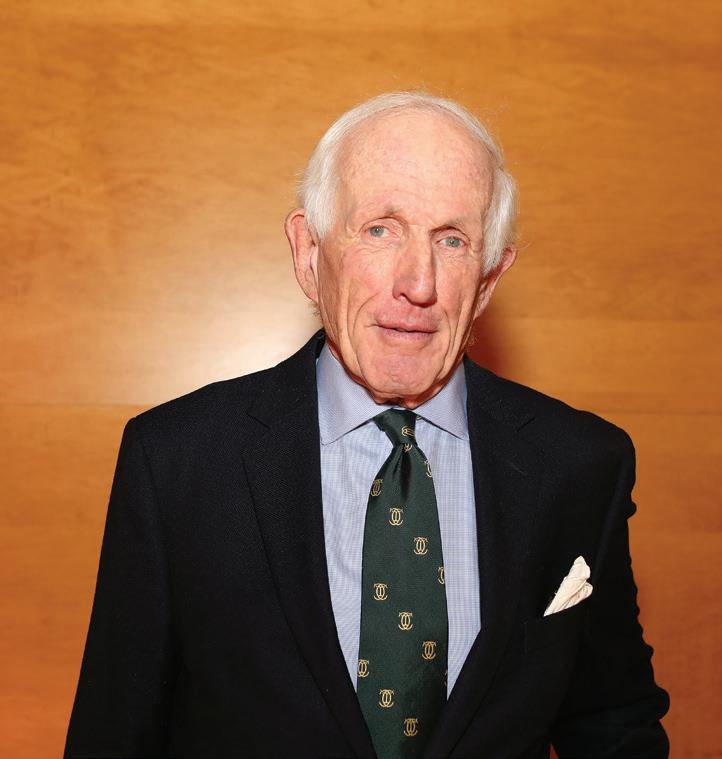
7 minute read
Boisjoli takes film to the Oscars
Old Boy NEWS
Boisjoli takes film to the Oscars
It’s a Veritas rule: when a Selwyn House School Old Boy gets nominated for an Academy Award for one of his first films, he has to take his mom as his date to the Oscars. “She loved it,” says Evren Boisjoli 2008. “She got to meet Lady Gaga.”
Everyone at Selwyn House had been watching the 2018 Oscars race closely since January, when it was announced that a film produced by Evren had been nominated for an Academy Award in the category of Best Live-Action Short.
Directed by Jeremy Comte and produced by Evren and Maria Gracia Turgeon, and shot near Thetford Mines, Quebec, the film tells the story of two boys engaged in a playful battle of wills that gets out of hand.
Fauve is not the first film made by Evren, and this is not the first time he’s won a major award for his work. Fauve won the special jury award for live action short films at the Sundance Film Festival last year. But this was the top of the heap. The Academy Awards. The Oscars. How on earth did this happen?
The film began as the brainchild of Comte, a filmmaker from Sherbrooke, who based the story on his own childhood. “Jeremy did a lot of research into boys of that age and how they are becoming much stronger and much more able, but the part of their brain that develops last is this ability to understand consequence,” explains Evren.
The location is almost one of the characters in the piece. “We drove eight hours a day on Google Earth, scouting locations, jumping from one to the next,” Evren recalls. They settled on a decommissioned surface mine that was still being used as a quarry.
“The mine is a man-made mess, but ultimately it’s Nature that claims the boys, and it’s their own nature, as well, that led them to that point.”
The title refers to a wildcat or a savage animal, but it also refers to the Fauvist art movement, as well as to the colour of a fox that appears in the film. A lot of the meaning—including the title—works better in French, Evren says. “The visual language is very, very specific.”
Jeremy and Evren went to the mine site a few days before shooting and lived in a little camper van, working out a detailed plan for the shots.
In casting the main characters, they first auditioned boys from Montreal, but found it didn’t feel right, so they went with local boys. “They’re a little
more physical, a bit rougher. Being from Sherbrooke, Jeremy was looking to recreate the vibe he remembers from his boyhood.
“Jeremy wrote the story but he worked with the actors to build the dialogue in order to make it more realistic. All the swearing, the en région language, that’s just the way these kids talk. We wanted them to feel free.
“We had a fantastic director of photography named Olivier Gossot. I think his last three films were at Cannes. His career is still exploding. There’s a lot of work put into that. It’s certainly not by accident. Jeremy was really adamant about going to get the best colour, so he ended up flying to Chicago to work with one of the top colourists with a company called The Mill.
“Fauve won an award at one of every two festivals where it was entered,” Evren says. Over 125 festivals. Over 65 awards, seven of them Oscar-qualifying. An unheard-of number.
“We made the decision [to take a run at the Oscars] because we had this epic publicist at Sundance, Kathleen McInnes, who has followed us through
our entire journey. She believed in the project since day one. She asked us: ‘You guys are doing very well with this film, and you just won the Special Jury Prize, so now you have to decide: Do you want an Oscar, do you just want to make your next feature, or do you want to make money with this film, because those are three separate paths that might not lead you to the same festivals.’”
“We all three simultaneously said, ‘We’re going to the Oscars.’ So we knocked ourselves out getting every grand prize that earned us points toward an Oscar.”
Out of thousands of short films made each year, 100 to 140 apply for an Oscar, Evren estimates. That number is whittled down to a shortlist of 10, then down to five actual nominees.
“This film somehow cut through,” says Evren. “I don’t fully understand the magic, but it cut through everything.”
Cut to Evren, his colleagues and his mother on the iconic Red Carpet, amazed by the “proximity” of it all. Brushes with stars take on a bizarre quality when you realize that, for the first time, you are encountering these famous faces in an unscripted moment.
“When you see them in a movie they’re not reacting to you,” Evren says.
In the surprisingly small auditorium, the drama doesn’t stop during commercial breaks, with stars sometimes reacting negatively to what is going on.
For our Selwyn House party, the suspense got unbearable as the announcement of the winners was repeatedly postponed.
Then the word: the Oscar goes to another nominee, and suddenly the storm has passed.
“Shaking with a combination of adrenaline and relief, we make our way out of the auditorium and order drinks,” Evren recalls. “I turn around and there’s Alfonso Cuaron [director of Roma], who turns out to be very gracious, and then [BlacKkKlansman director] Spike Lee congratulates us on our nomination.”
Evren was taken aback to get such an acknowledgement from his much-morefamous peers. “There’s a mutual respect among the artists there,” he says.
Just another day in Tinseltown. Before the Oscars, Evren had been doing other red carpets and press junkets on a daily basis, including appearances at the Canadian consulate and at an event for women in film.
“These films take on a life of their own,” Evren says. “Fauve is still playing—and winning awards—at festivals today.”
Back in Montreal, Evren graduated from the Canadian Film Centre just before the Oscars, and is developing his post-production film company, where they’ve tripled their studio space to 6000 square feet.
And his 2016 film We’re Still Together is finally getting its U.S. release. One of his co-producers on that project was Selwyn House Old Boy Marley Sniatowsky 2007
Looking back on his big night in Hollywood, Evren says he had no real understanding of what it means to find yourself in the running for an Oscar. The world of awards can take over one’s entire career.
“It becomes a part of your identity.
“I don’t know if I was prepared to win,” Evren admits. He recalls a fellow nominee saying, ”I hope I don’t win. I need to work this year.”
“I do think [the Oscar nomination] will help me, but it’s hard to say what the impact will be. Now that the suspense is over, he says, “I can move on in my life.”
Among other things, moving on includes Evren’s recent role at the Annual Conference of the International Boys’ Schools Coalition, where he and Reid Hannaford 2012 gave a workshop on confidence in filmmaking, and his introduction of Quebec film director Jean-Marc Vallée as a plenary speaker.
IBSC was an “important milestone” in his career, he says, because it allowed him to give back to the school where his film career was born.
Old Boy NEWS
Boisjoli
Because of Selwyn House and media teacher Bill Bedard, “I was able to consider [a career in film] as early as Grade 9.”
“Bill’s continued support through high school and after has propelled me into the film world with confidence,” Evren says. “The opportunities and skills that Bill and Selwyn House taught me had a direct impact on much of the success I achieved at such a young age.”
Obviously, Evren says, attending Selwyn House “ultimately benefitted me a great deal.”
Old Boys in Hollywood
We’re Still Together, a feature film Evren produced, received a rave response at the Karlovy Vary International Film Festival in Prague in 2016. An IndieWire reviewer described the film as “a smart and sensitive micro-budget drama” that “muscles its way above the masses on the strength of its unpredictability.” One of his producers on We’re Still Together was Old Boy Marley Sniatowsky 2007. In 2015, Evren and Nicholas Cabana 2006 teamed up to produce a music video for the DJ/producer Kaytranada entitled “Lite Spots.” The video garnered numerous awards and nominations, including a Much Music Video Award nomination for Best Music Video and a nomination for Best Dance Music Video at the U.K. Music Video Awards. It was also named No. 2 Music Video of the Year in Rolling Stone magazine, and was nominated for the Young Director Awards at the Cannes Lions Festival. The clip was nominated for Best Music Video at the 2017 Junos. The album on which the song appears won the Juno for Electronic Album of the Year.










